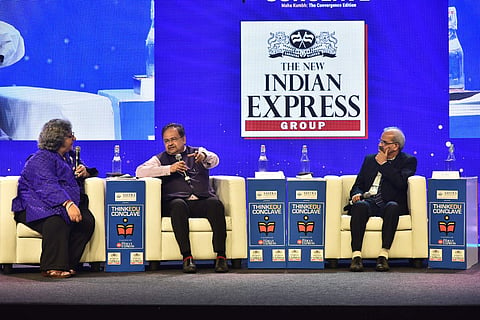

In a thought-provoking session at The New Indian Express' 13th ThinkEdu Conclave 2024, presented by SASTRA University, in Chennai, directors of two premier institutes, Debashis Chatterjee of IIM Kozhikode and VK Tewari of IIT Kharagpur, underscored the urgency of revamping the current education system.
Speaking at the panel titled “Learning Soft Skills: Why Engineers Need to be Managers,” chaired by senior journalist Kaveree Bamzai, Chatterjee advocated for a disruptive approach, asserting that the existing successful legacy of IIMs, spanning over six decades, needs deconstruction and restructuring to align with the evolving global trends.
“We acknowledge the imperative to overhaul the entire structure. The challenge lies in navigating the successful legacy of the IIMs, spanning 60 years. Introducing changes faced resistance, as exemplified when we enrolled 54 Gulf students at IIM Kozhikode. My peer group opposed tampering with a successful system. However, for IIMs to retain relevance in 2047, we must undertake a process of deconstruction and disruption,” he said, adding that failing to initiate this transformation now would leave room for others to take the lead, jeopardizing our continued supremacy.
Speaking on the significance of soft skills, Chatterjee said – “Students risk overlooking crucial aspects of organisational life without soft skills, emphasising the imperative to extend learning beyond mere functional proficiency. Regrettably, our education system compartmentalises subjects, separating hard skills from soft skills.”
He said unlike IIT and IIM systems, where these skills are integrated into the curriculum, there are more proficient engineers outside this system.
As we transition into an economy centered around innovation rather than production, Chatterjee noted that for Indian education to gain global recognition, a shift towards emphasising values alongside skills is essential.
Speaking on the paradigm shift in learning, Tewari highlighted the fierce competition faced by today’s aspirants, significantly different from the scenario when he appeared for the Joint Entrance Examination (JEE).
“When I took the JEE, approximately 80,000 individuals participated, with roughly 2,700 securing selection. Presently, the scenario has evolved, with over 13 lakh candidates engaging in JEE. Subsequently, around 1.75 lakh proceed to the next stage, resulting in an output of approximately 64,000 individuals.”
He pointed out the crucial role of soft skills, often overlooked in the intense competition for entrance exams, in securing job interviews and effectively leading teams. Tewari suggested that students should actively engage in extracurricular activities to cultivate soft skills, emphasising their importance in managerial roles.
“These extracurricular activities are invaluable learning experiences, often surpassing what students gain in the classroom. I consistently encourage them to draw insights from these activities because, especially in today’s job market, where engineers are transitioning into various managerial roles, soft skills play a pivotal role in ensuring success.” He emphasised that adaptability and the ability to manage diverse teams are essential qualities for engineers and leaders in today’s professional landscape.
The directors collectively stressed the need to shift from a rigid, subject-siloed educational structure to one that integrates both hard and soft skills, preparing students not only for technical roles but also for effective management and leadership positions in the ever-evolving economy of innovation.
